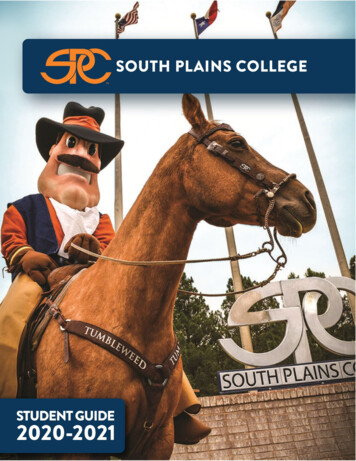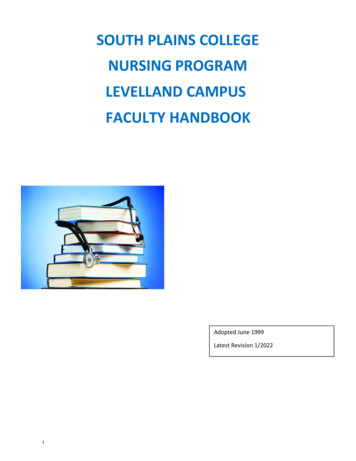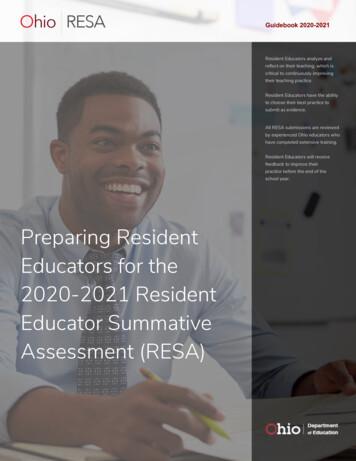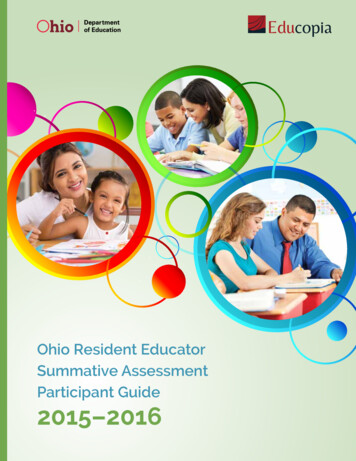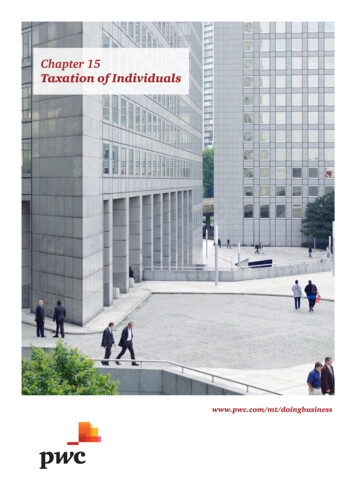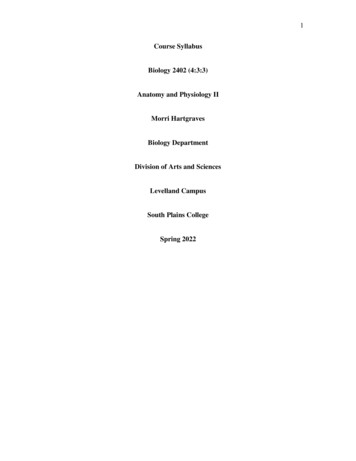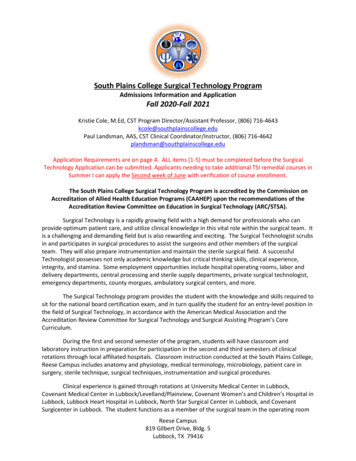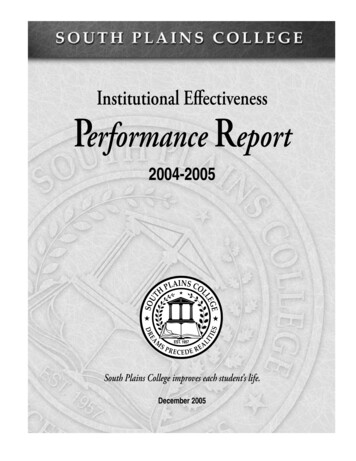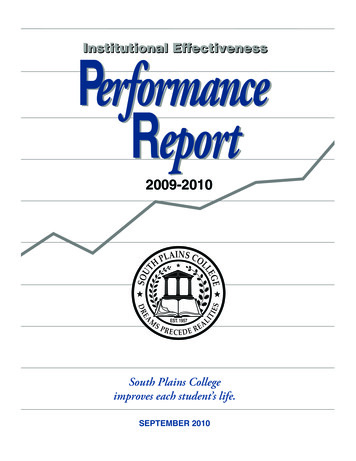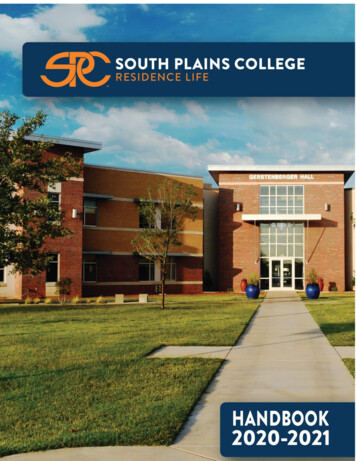
Transcription
2020-21 Residence Life HandbookDear Resident,1
22020-21 Residence Life HandbookWelcome to South Plains College and our community! We are so excited you have chosen SPC tocontinue your education. Residence Life staff are looking forward to getting to know you thisyear!Residence halls are an ideal place to broaden your life experiences and make lifelong friends.Students from all backgrounds, cultures, lifestyles and attitudes live on campus creating a richcommunity and diverse student body. You will have the opportunity to learn to communicate andinteract within a community while you learn more about yourself and others.Residence Life staff are available to assist residents. They will work with you to create anatmosphere which supports academic, intellectual, social and emotional growth. This growth willbe accompanied by responsibilities to yourself, your roommate, and the residential community.We expect that you will respect the privacy of your fellow residents, encourage practices whichcreate and support a learning environment, and do your part to promote a safe and securecommunity.Please take time to review the Residence Hall Handbook and the SPC Student Guide. We wantyou to get the most out of your experience at South Plains College!We look forward to getting to know you. If we can help you in any way or if you need moreinformation, please do not hesitate to reach out. We wish you the best this year!Sincerely,Shane HillAssociate Dean of StudentsSouth Plains CollegeContent exported to PDF document on June 3, 2020. Any corrections to the information found within this document isavailable online at catoid 53&navoid 1561
2020-21 Residence Life Handbook3TABLE OF CONTENTSRESIDENCE LIFE MISSION AND GOALS . 7Mission . 7Vision . 7Goals for Housing & Residence Life . 7Residence Hall Association (RHA). 7Residence Hall Student Rights . 7Residence Hall Student Rights . 8Roommate Agreements and Conflicts. 8Roommate and Suitemate Agreements . 8Communicating with Your Roommate . 8Roommate Mediation. 9Room Change . 9Residence Life Administrative Procedures . 10Assignments . 10Break Housing. 10Checking in to Halls . 11Checking Out of Halls . 11Complaints . 12Confidentiality. 12Confiscation . 12Consolidation . 12Damages . 13Evictions . 13Extermination of Pests . 13Bed bugs . 13Exterminator Findings . 14Financial Responsibilities . 15Group Billing . 15Hall Staff . 15Resident Assistant (RA) . 15Hall Director . 15On-Call Hall Director . 15
42020-21 Residence Life HandbookResidence Hall Charges . 16Housing Security Deposit . 16Identification . 16Occupancy . 16Private Rooms . 16Programming . 17Reassignment . 17Refunds . 17Room Changes . 17Room Entry . 17Room Checks . 18Health and Safety Inspections . 18Technology Resources . 18SERVICES & AMENITIES. 19Counseling Services . 19Dining Services . 20Health Services. 20Key Card Access . 21Keys . 21Laundry Rooms . 21Mail Service and Delivery . 21Maintenance or Repairs. 22Storage . 22Vacuum Cleaners . 22Vending Machines . 22Campus Safety and Emergency Procedures . 22Campus Carry. 22Campus Safe Walk Request . 23Campus Police Department (CPD) . 23EMERGENCIES . 23Exterior Door Locking . 23Fire Safety Procedures . 24Fire Doors . 24Content exported to PDF document on June 3, 2020. Any corrections to the information found within this document isavailable online at catoid 53&navoid 1561
2020-21 Residence Life Handbook5Fire Drills . 24Fire Equipment and Exits. 24Liability . 25Loss of Property . 25Missing Student Notification . 25Reporting an Incident . 25Safety . 26Sexual and Gender-based Misconduct (Title IX) . 26Smoke Detectors . 26Tornado and Severe Weather . 26Residence Hall Policies . 27Abandoned Property. 27Alcohol Containers. 27Animals on Campus . 27Service Animal . 27Emotional Support Animal (ESA) . 28Appliances . 29Babysitting . 29Bicycles . 29Bulletin Boards. 30Cleaning . 30Cooking . 30Common Area Use . 30Darts and Dartboards. 31Decorations . 31Extension Cords and Surge Protectors . 32Guests . 32Host responsibilities . 32Escorting Guests . 32Overnight Guests . 32Co-Habitation. 32Holiday Decorations. 33Hoverboards and Skateboards . 33
62020-21 Residence Life HandbookLock-Out Policy . 33Mandatory Meetings . 34Motorcycles . 34Offensive Odors . 34Painting of Rooms . 34Personal Furniture and Items . 34Pranks . 34Projectiles . 35Quiet Hours . 35Repelling . 35Rooftops . 35Room Use . 35Running and Roughhousing . 35Solicitation . 35Street/Road Signs . 35Syringe Disposal . 35Trash. 36Tunnels/Crawl Spaces . 36Visitation . 36Visitation Hours in Residence Halls: . 36Windows . 37Resident Code of Conduct . 37Student Conduct . 37Dean Referrals. 37Procedures for Disciplinary Action . 37Penalties for Misconduct . 38Areas of Misconduct . 38Content exported to PDF document on June 3, 2020. Any corrections to the information found within this document isavailable online at catoid 53&navoid 1561
2020-21 Residence Life Handbook7RESIDENCE LIFE MISSION AND GOALSMissionSouth Plains College Residence Life improves the lives of its students by establishing afoundation for lifelong learning by providing a residential community that is innovative,educational, engaging, compassionate, safe, diverse and supportive of the College vision.VisionSouth Plains College Residence Life improves each student's life.Goals for Housing & Residence LifeHousing and Residence Life staff consistently seek to provide a welcoming and comfortablecampus environment. Highly trained staff and quality programs enhance student experiences andpersonal growth. South Plains College housing and hall staff strive to: Create an exciting campus community that engages residentsTeach sensitivity to the rights and values of othersEncourage personal accountability of every resident for his/her own actionsSupport the academic goals of residentsMaintain a campus environment which provides the opportunity for individual growthand developmentResidence Hall Association (RHA)Living on-campus at SPC is an integral part of the college experience. It is one of the best ways tobecome connected to our college community. As a governing body, the Residence HallAssociation (RHA) is the OFFICIAL voice of on-campus residents, serving as the liaisonbetween residents and the administration. We inspire growth, leadership, and involvementthrough our development of residence and campus life.RHA is responsible for residence life programming, leadership development, fundraising,community service, and student advocacy within the residence halls. RHA exists to supportstudents' leadership skills and hear student concerns and what they would like to do forprogramming. RHA strives to provide a space of engagement and community for students thatlive on campus.Weekly meetings every Wednesday at 4:00 PM in the Library. All residents are members and allare welcome in any meeting at any time!Residence Hall Student RightsSouth Plains College has basic rights that govern the special nature of interpersonal relationshipsin the residence halls. These rights define reasonable expectations that students should have forone another while sharing space in residence halls.In a group living situation, it is important for students to understand their rights as a resident andtheir responsibilities to others. The rights to study and sleep are considered primary in theresidence hall environment as part of an optimum environment for students to learn and grow.
82020-21 Residence Life HandbookSPC residence halls are rich with diversity. Student values and worldviews may be challengedwhile living on campus, therefore it is imperative that students learn to recognize, understand andcelebrate human differences.Each resident can expect to have the following rights while living on campus. These rights applyto all students in residence halls. Violating the rights of another student or students may result indisciplinary action and/or reassignment to another room or residence hall.Residence Hall Student Rights The right to sleep during the night undisturbed.The right to sleep in one's room free of noise and distractions during quiet hours.The right of access to one's room and facilities at all times.The right to feel secure against physical or emotional harm.The right to a clean room and clean common areas.The right to have one's belongings respected.The right to have guests in the room when they will not disturb your roommate's right tosleep or study.The right to privacy.The right to redress grievances and due process.Roommate Agreements and ConflictsLiving with roommates isn't always easy. Sharing a living space may be stressful and conflictsmay arise. Sometimes situations that work at the beginning of the year become more difficult asthe year goes on. It is perfectly normal to have roommate conflicts.Many conflicts can be resolved easily with mature and respectful conversation betweenroommates. Other conflicts may be more difficult to resolve and may require assistance througha formal mediation process. In extreme cases, conflicts may not be able to be resolved resultingin a room change for one or both roommates.Roommate and Suitemate AgreementsAt the beginning of each semester, roommate agreements will be facilitated by hall staff. Thiswill be a time for roommates and/or suitemates to have a conversation about healthy boundariesand expectations they have for each other. Topics will include noise, visitation, use of personalitems, food, cleanliness, etc. You should keep your agreement available in the room or theResident Assistant will have a copy on file in the Hall Director Office.Communicating with Your RoommateIf you start to notice that your roommate does not want to talk with you, may get annoyed withyou over little things, may leave the room when you are there, you should recognize these assigns of potential roommate issues. If a problem is addressed early, there is a better chance of itbeing worked out amicably. Most roommate conflicts are the result of miscommunication or, insome cases, a total lack of communication. If you can communicate effectively, it will be mucheasier to develop a comfortable living environment for yourself and your roommates.Content exported to PDF document on June 3, 2020. Any corrections to the information found within this document isavailable online at catoid 53&navoid 1561
2020-21 Residence Life Handbook9How to address the issue: Approach your roommate in private.Confirm that this is a good time for both of you to talk. If either of you feels rushed orblindsided the conversation will be less effective.Be direct. Discuss the issue with regard to behaviors rather than personality traits. Thistactic is less likely to put your roommate on the defensive.Be patient. Listen to your roommate and remember that there are two sides to everystory. As you are listening, try to put yourself in your roommate's shoes.Each person should be given an opportunity to share their perspective on the roommaterelationship and potential areas of tension.Revisit your roommate agreement. Which of your guidelines are working and which ofthem need to be reconsidered?Remember that a solution will probably involve each person giving something andgetting something. The solution may not be your ideal scenario, but it should be animprovement on the current state of things.Roommate MediationIn difficult discussions, such as roommate conflicts, it is very helpful to have an unbiased thirdparty to help mediate the discussion. Our Hall Directors are trained mediators, with experiencehelping roommates find solutions to their conflicts. If you find that you and your roommate arehaving difficulty resolving your conflict, you should definitely approach your Hall Director toarrange mediation.We believe that Roommate Mediation is paramount to the learning process and the developmentof conflict management skills. As such, we require all students involved in a roommate conflictto participate in mediation before changing rooms.How Mediation Works Contact your HD, either by email or in person, to explain the situation and to requestmediation. Your HD will contact all roommates to find a time that works best for everyone. The HD and a co-mediator will begin the conversation. The HD will explain the groundrules; discuss confidentiality and the mediation process. The mediators will type up the agreement and will schedule a follow up meeting for twoweeks after the original meeting. The follow up meeting will be used to determine if theagreement will be effective in resolving the conflict.Remember, although the HD is a trained mediator, he or she is not a magician. Some roommateconflicts require a number of mediations before a solution can be found. In other cases, theroommate relationship may not be mended even after an honest attempt at mediation has beenmade. In those cases, and only in those cases, a room change may be the best answer.Room ChangeSometimes, roommate conflicts do result in the student deciding to change rooms. ResidenceLife staff will work with students to find new room accommodations on campus. Students are
102020-21 Residence Life Handbookrequired to participate in roommate mediation before a room change is approved. This is toensure that students have the opportunity to intentionally engage in learning conflict managementskills and to ensure all roommates have the experience of attempting to compromise and work outa solution, which is an important part of community life.The role of Residence Life staff is not to determine which roommate is at fault. Rather our role is(a) to assist in the communication which is aimed at resolving conflict and (b) to make logisticalarrangements for room changes when necessary. This means that we will work with studentswho ask to move into a new room. We will not make their roommate move unless this is anagreed upon solution reached during mediation or unless the roommate has been foundresponsible for violating the roommate agreement or mediation agreement. The College'sconduct and due process system is used to determine responsibility in these matters. If thecomplaining student desires a roommate change, but does not wish to engage the conduct processand the College is asked to determine who will move, the complaining student will be asked tomove to a new room. Adapted from Sarah Lawrence CollegeResidence Life Administrative ProceduresAssignmentsThe College and the Residence Life Office reserve the right to determine room and residence hallassignments. Assignments are made on a first come-first served basis.Students who do not designate a roommate request on their housing application will be assigned aroommate(s) on the basis of all information listed without regard to race, color, sexualorientation, creed or religion. All assignments are made by priority according to the date astudent's completed application and security deposit are received by the Residence Life Office.If the requested residence hall is full, the student will be assigned a room in another residence hallas vacancies exist. Students will be assigned to overflow housing if no permanent assignmentscan be made. Students will remain in overflow housing until a permanent room assignment ismade available.Students must fill out a new application for each semester they wish to live in a re
South Plains College Residence Life improves the lives of its students by establishing a foundation for lifelong learning by providing a residential community that is innovative, educational, engaging, compassionate, safe, diverse and supportive of the College vision. Vision South Plains College Residence Life improves each student's life.
